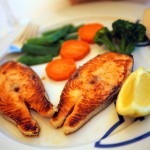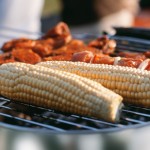It’s barbecue season! Want to partake in this American summer staple, but worried about the effect on your body? Don’t fret. Barbecue can be both healthy and delicious. Just remember these three tips!
Choose Lean, Fresh Meat:
It’s a common misconception that meat needs to be fatty to taste great grilled. Lean meats such as skinless poultry (i.e. chicken and turkey), pork tenderloin and fish can be just as tasty as their fatty counterparts. Red meat is higher in fat, but that does not mean a barbecue season without burgers and steaks. Stick to leaner cuts such as round, flank, sirloin or lean ground and trim away visible fat.
When it comes to bacon, hot dogs and other processed meats, beware. Most processed meats are high in sodium, saturated fat and preservatives. Sodium nitrate, the preservative that keeps meats such as hot dogs pink, has been found to increase risk of heart disease. Studies have also found that high intake of processed meat can increase risk of colon cancer by about 20%. Fresh meat doesn’t contain any of these harmful substances, making it a much healthier option.
Maintain Balance:
Fruits and vegetables are low in calories, high in nutrients and should make up half your plate. So, don’t let meat steal the spotlight. Give produce its time to shine.
Veggies hot off the grill are delicious enough to stand on their own, but can also be used to jazz up a salad or sandwich. Vegetable sides such as green bean and cucumber salads are healthy, refreshing and easy to prepare.
Kabobs are another great way to incorporate fresh summer produce. Adding fruits or vegetables between the cubes of meat cuts calories and enhances flavor. Having trouble getting your little one to eat their veggies? Let them create their own kabob combo. Studies find that kids are more likely to try new foods that they helped prepare.
Store bought condiments are often laden with sodium and sugar. Accompany meat with fresh guacamole, salsa or pico de gallo instead. They are easy to make and elevate the flavor of any dish. In a time crunch? Add fresh fruit, such as watermelon or mango to your favorite store bought salsa or pico de gallo to liven it up. Fresh summer fruits are sweet, juicy and vitamin packed. Grilled pineapple, peach and pear make excellent desserts. Serve them alone or as a topping.
Be Clean:
Barbecue safe, clean and foodborne illness free! Raw meat and its juices contain harmful bacteria. Each type of meat has a specific minimum internal cooking temperature that must be reached to ensure safety. Invest in a meat thermometer and before firing up the grill, check out this Safe Minimum Cooking Temperatures chart from FoodSafety.gov. Be sure not to use the same platters or utensils for raw and cooked meat to avoid recontamination. Got lots of leftovers? Toss any dishes that have been out for more than two hours (one hour on hot days). Rule of Thumb: When in doubt, throw it out!
Research shows that exposing meat to open flames produces carcinogens, cancer causing compounds. This does not mean to forgo the grill, but there are some precautions to take. The National Cancer Institute (NCI) recommends precooking meat in a microwave to decreased cook time on the grill. When fat melts and drips into the fire, it creates harmful aromatic carcinogens, which end up on our food. Choosing lean meat, removing skin from poultry and trimming visible fat decreases this phenomenon. Overcooking meat also produces carcinogens, which a study suggests significantly increases risk of pancreatic cancer. Once the minimum internal temperature has been reached, remove the meat from the heat. To prevent both overcooking and charring, cook meat over a low flame. If accidental charring does occur be sure to scrape it off before eating.
Lori Rosenthal, MS, RD, CDN
Bariatric Dietitian
Twitter: LoRoRD
 Subscribe
Subscribe
